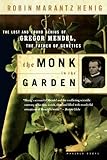The Monk in the Garden: The Lost and Found Genius of Gregor Mendel, the Father of Genetics
The Monk in the Garden: The Lost and Found Genius of Gregor Mendel, the Father of Genetics

In THE MONK IN THE GARDEN, award-winning author Robin Marantz Henig vividly evokes a little-known chapter in science, taking us back to the birth of genetics, a field that continues to challenge the way we think about life itself. Shrouded in mystery, Gregor Mendel's quiet life and discoveries make for fascinating reading. Among his pea plants Henig finds a tale filled with intrigue, jealousy, and a healthy dose of bad timing. She "has done a remarkable job of fleshing out the myth with what few facts there are" (Washington Post Book World) and has delivered Mendel's story with grace and glittering prose. THE MONK IN THE GARDEN is both a "classic tale of redemption" (New York Times Book Review) and a science book of the highest literary order.The Moravian monk and naturalist Gregor Mendel (1822-1884) labored quietly over the years in his abbey's garden, becoming known locally as a reliable meteorologist with an unusually green thumb. He was much more than that, of course, but his transforming experiments in what a later acolyte would call "genetics" were less well known. When he published the results of his many attempts to discover the mechanisms by which traits are passed from one generation to the next--in Mendel's case, in sweet peas--it was in the proceedings of a local scientific study group, and it would take nearly two decades before researchers in more august institutions would in turn discover Mendel's work and apply it to their own revolutionizing biology in the process.
Mendel's life was full of disappointments: he failed his qualifying examinations to teach high school several times, and he had trouble getting the scientific establishment of his day to take him seriously. In her lucid, often moving life of the great (and to all purposes self-taught) scientist, Robin Marantz Henig gives readers a view of the deeply religious man himself and of his work not only in the context of his time but also in light of recent developments in the constantly changing field of genetics. Taking issue with historians of science who have sought to discount Mendel's contributions to the field, she makes a well-defended claim that the monk in his small garden should be honored as a genius: "a man with a vision and the dedication to carry it to its brilliant, radical conclusion." Her book is a fitting, and very welcome, memorial. --Gregory McNamee

List Price: $ 17.95
Price: $ 2.38
No comments:
Post a Comment